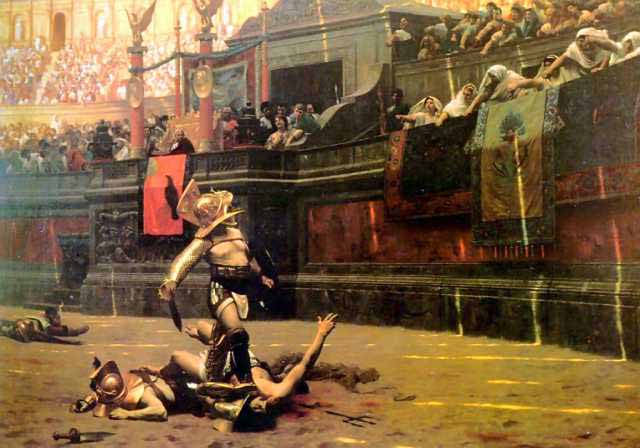Spoiler Alert: contains key plot points from The Hunger Games Trilogy
 |
| http://www.jensc.org/wp-content/uploads/2012/01/HG2.jpg |
One of the things I noticed while reading
The Hunger Games Trilogy was the numerous ways in which the Capitol resembles ancient Rome, probably the most obvious being the gladiatorial like games that they hold for both the punishment of the defeated and for their own entertainment. However, the resemblance goes much deeper than this.
Something that struck me almost immediately was the first names of the Capitol's citizens: Cinna, Caesar, Plutarch, Flavius, Octavia, Venia, to name a few. The first name of every person from the Capitol is a traditional Roman name. I decided that the author,
Suzanne Collins, was purposely trying to create a connection in the minds of her readers between the Capitol and ancient Rome, and so I began searching for more similarities.
 |
| http://thehungergames.wikia.com |
I then realized that both ancient Rome and the Capitol had penchants for excessive wealth that they relied entirely on their providences/Districts to provide. A very specific example occurs in
Catching Fire when Katniss is disgusted by the Capitol practice of making oneself puke at a dinner party in order to make room for more food. The Romans also indulged in this disgusting habit. I later discovered in
Mockingjay, that Plutarch directly compares the conditions in the Capitol to the 'Bread and Circuses' of Rome.
There is also an interesting correlation between President Coriolanus Snow and the emperors of ancient Rome. In ancient Rome, the emperors often gained and held power by whatever means necessary. In
Mockingjay, Finnick Odair reveals the brutal tactics that Snow used in his ascension to power, including a Roman favorite, poison. Readers are treated first hand to the threats, torture, and executions Snow uses to maintain his position.
There exist many more examples I could point out but instead I'll ask a question. Why is Suzanne Collins making these comparisons between the Capitol and an ancient civilization from thousands of years ago? In
Mockingjay, Plutarch mentions that Panem had once been a republic, another quality it shares with Rome. Now think of the implications when considering that in the first book, Katniss relates that Panem was once known as North America.
 |
| http://www.crystalinks.com/romerecreation.html |
Carl Becker stated in
Everyman his own Historian, "to be prepared for what is coming to us it is necessary not only to recall certain past events but to anticipate the future." I think Suzanne Collins trying to use her vision of a dystopian future to warn us that we need to learn from the mistakes of the past. This is why she ends
The Hunger Games Trilogy with Plutarch's expression of hope that the people of Panem will learn from their recent history.














